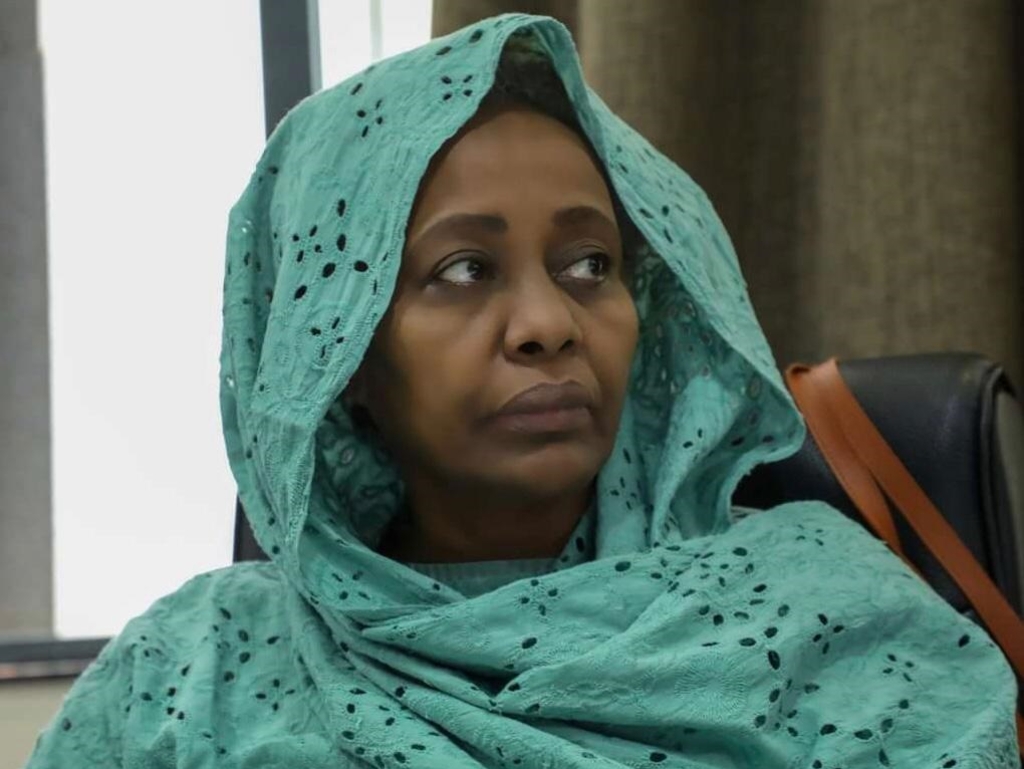Since April 2023, Sudan has been embroiled in a brutal conflict between the Sudanese Armed Forces and the Rapid Support Forces. As a result, tens of thousands of people have been killed, twelve million have been displaced, and famine is imminent. On 24 July 2024, the United States invited the Sudanese Armed Forces and the Rapid Support Forces to peace talks in Switzerland to take place on 14 August. So far, similar initiatives to bring about a ceasefire have failed. Prominent Sudanese mediator and peace activist Rabab Baldo is part of our global network Feminists Connecting for Peace. She has decades of experience working for a just peace in Sudan and explains what needs to happen for the talks in Switzerland to succeed.
We women are always trying to save our country, but we are never consulted, and Sudan is paying a heavy price for that.
PeaceWomen Across the Globe: What are your hopes and expectations for these negotiations?
Rabab Baldo: We are now in the second year of the war and there has not been a single day without gunfire. The war is spreading, people have been displaced several times. The Sudanese people, and women in particular, are suffering enormously. Women have been enslaved and subjected to sexual and other violence. Both sides are committing massive human rights violations. What I want now is a permanent and comprehensive ceasefire agreement. This time it must be done right.
What does that mean? What needs to happen for these negotiations to be successful?
Comprehensive means that other stakeholders, including women, youth, civil society and people with disabilities, must be part of the process. A few months ago, together with over 26 Sudanese organisations and networks, I launched a “shuttle diplomacy initiative” to send women peace activists to different countries to advocate for peace and protection in Sudan. Switzerland also hosted two Sudanese delegates in mid-July. Now we are working to make women an integral part of these ceasefire talks. Why does everyone expect the men who are fighting to be able to make peace? The concerns of civilians, of women, must be at the heart of these talks. The widespread sexual violence against women, the occupation of public infrastructure – such as hospitals – by armed troops needs to be addressed. If civilians are not included, we will repeat the mistakes of previous mediation efforts.
What should Switzerland do?
Switzerland is a country that respects international humanitarian law and international human rights standards; it hosts the UN and the ICRC. It is at the forefront of efforts to defend women's rights worldwide. I hope the Swiss government won't abandon Sudanese women. Switzerland must walk the talk and invite Sudanese women to be part of the peace process and show us that it is living up to expectations. The peace process must be inclusive.
What role can women play in the broader Sudan peace process – what role are they already playing?
Sudan has a long history of war. I have been working since the 1990s to involve women in peace processes, and over the years I have reached out to women in every corner and region of Sudan. Women are ready to participate, they have the skills and knowledge to engage. Women are at the forefront of peace initiatives in their communities, working for reconciliation and against division. In this war, too, they are leading the humanitarian response – and being targeted for it. But they are constantly denied the opportunity to participate in formal processes. We women are always trying to save our country, but we are never consulted, and Sudan is paying a heavy price for that. Now, as part of the shuttle diplomacy initiative, we have developed a shadow peace agreement based on Resolution 1325 on Women, Peace and Security. It calls for an inclusive peace agreement that meets the aspirations of the Sudanese women. We have already shared it with the US administration, but no one is interested in listening to us and include us. Because the ceasefire talks are seen as a male-dominated area. Women are always told to wait, women and civilian issues always come later. That has to change now.
Rabab Baldo is a gender and peace activist. She worked as Senior Gender & Inclusivity Advisor and international consultant for the UNDP and Inclusive Peace, among others. She also served as a Special Envoy for Sudan and South Sudan with UN Women and the Office of the Intergovernmental Authority on Development (IGAD).
This time, it has to be done properly
Interview on swissinfo
War in Sudan: How women want to influence the peace process in Geneva: In this article on swissinfo concerning the negotiations in Geneva, Rabab Baldo explains how Sudanese women are working for peace and our Director Deborah Schibler explains the impact of women's participation on peace processes.
The article is available in six languages, including German, French, Arabic and Spanish.
Interview on NADJA
Rabab Baldo was interviewed by the international news platform NADJA. In the article "Just let us live: Sudan's war and women's vital role in peacebuilding" you can find out more about the role of women in peacebuilding in Sudan.
Further information
Information on our Sudan programme in our Peacebuilding During Peace Negotiations pillar.
Earlier and later events
Previous post:
